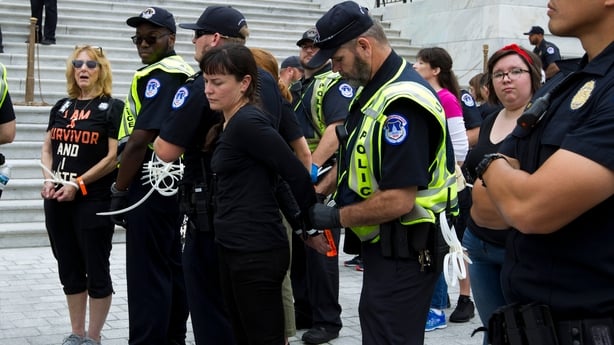A deeply divided US Senate confirmed Brett Kavanaugh to the Supreme Court, as Republicans dismissed sexual assault accusations against the conservative judge and delivered a major victory to US President Donald Trump.
By a vote of 50-48, the Senate gave a lifetime job to Mr Kavanaugh, aged 53, after weeks of fierce debate over sexual violence, alcohol abuse and privilege that convulsed the nation just weeks before congressional elections on 6 November.
Mr Kavanaugh will be sworn in almost immediately by Chief Justice John Roberts, according to a statement from the court.
We need your consent to load this rte-player contentWe use rte-player to manage extra content that can set cookies on your device and collect data about your activity. Please review their details and accept them to load the content.Manage Preferences
The Senate vote takes the highest US court down a more conservative path for perhaps a generation and is a bitter blow to Democrats already chafing at Republican control of the White House and both chambers of the US Congress.
Adding to the drama, women protesters in the Senate gallery shouting, "Shame on you," briefly interrupted the start of the final confirmation vote this evening.
Hundreds of protesters against Mr Kavanaugh gathered on the grounds of the Capitol and at the Supreme Court. A total of 164 people were arrested in the protests, US Capitol Police said.


Mr Kavanaugh's nomination became an intense personal and political drama when university professor Christine Blasey Ford accused him of sexually assaulting her when they were high school students in a wealthy suburb of Washington in 1982.
Two other women accused him in the media of sexual misconduct in the 1980s.
Mr Kavanaugh fought back hard, denying the accusations in angry and tearful testimony before the Senate Judiciary Committee that was viewed live on television by around 20 million people.
Mr Trump stood by Mr Kavanaugh, a federal appeals court judge with a history of advancing Republican causes, and this week mocked Dr Ford's account of what she says was a drunken attack on her by Mr Kavanaugh when they were teenagers.
Mr Trump, seeking a legacy as the president who put a strongly conservative stamp on the court, praised the Senate for its vote.
I applaud and congratulate the U.S. Senate for confirming our GREAT NOMINEE, Judge Brett Kavanaugh, to the United States Supreme Court. Later today, I will sign his Commission of Appointment, and he will be officially sworn in. Very exciting!
— Donald J. Trump (@realDonaldTrump) October 6, 2018
The confirmation allows Mr Trump to hit the campaign trail ahead of the congressional elections saying that he has kept his 2016 promise to mould a more conservative American judiciary.
Democrats said Mr Kavanaugh's partisan defence of himself, in which he said he was victim of a "political hit," was enough itself to disqualify him from the court.
Repeatedly during the Senate debate, Republicans accused Democrats of staging a "smear" campaign against Mr Kavanaugh to prevent a conservative becoming a Supreme Court justice.
The accusations against Mr Kavanaugh energised the #MeToo social media movement that emerged after high-profile accusations of sexual assault and harassment by men in politics, the media and the entertainment industry.
Read more:
- From bars to Air Force One, US transfixed by Kavanaugh hearing
- Trump under fire over Blasey Ford comments at campaign rally
- Judiciary Committee receives FBI report on Kavanaugh allegations
Mr Kavanaugh will join four liberal justices and four other conservatives as the court, which is expected soon to hear controversial disputes involving abortion, immigration, gay rights and voting rights.
The dispute over Mr Kavanaugh has added fuel to campaigning for the midterm elections in November when Democrats will try to take control of Congress from the Republicans.
Several polls show that Republican enthusiasm about voting, which had lagged behind, jumped after the Mr Kavanaugh hearing last week.
But Democrats hope women angered at the Kavanaugh accusations will turn out in large numbers to vote out Republicans.

